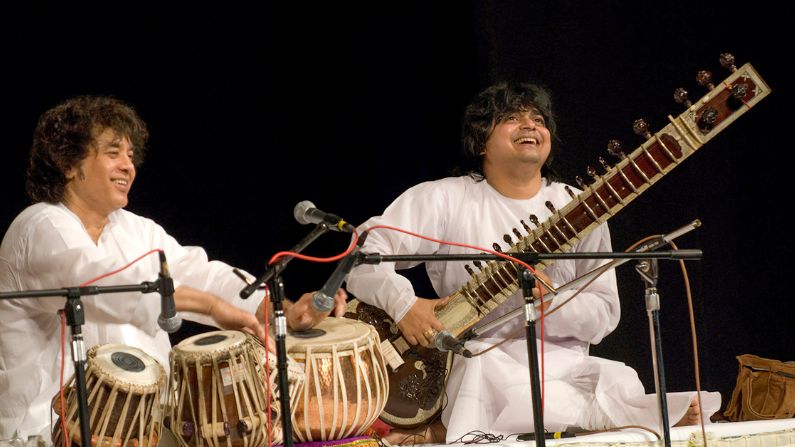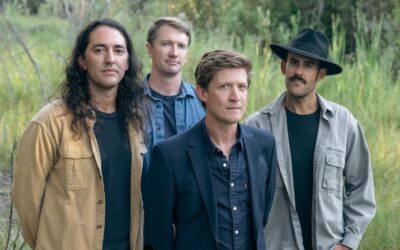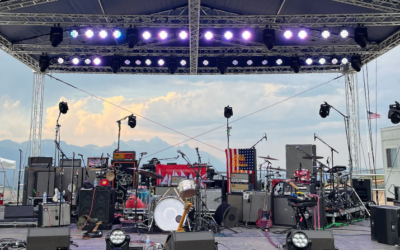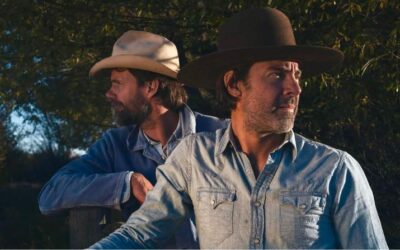Zakir Hussain is a master of the Indian tabla: a twinned pair of hand drums used as the principal percussion instrument in Hindustani classical music. Regarded as a national treasure in his native India, Hussain is one of the world’s most esteemed and influential musicians, renowned for his genre-defying collaborations and legendary percussion skills.
Hussain is a multiple Grammy award-winner and the recipient of countless other honors. He has taught at Princeton, Stanford, and the University of California at Berkeley, and is the founder and president of Moment! Records, an independent record label presenting rare live concert recordings of Indian classical music and world music.
In advance of his show here in Jackson at the Center for the Arts on November 9th alongside the world-renowned sitar player Niladri Kumar, Zakir Hussain joined us over the phone.
This conversation was recorded on Friday, Oct. 7.
JACK CATLIN/KHOL: I was watching an interview of yours where you mentioned speaking in rhythms with your father. Can you touch on that? How exactly does that work where you’re you’re using the rhythm as language? And how does it inform your creative approach or did it in those beginning stages.
ZAKIR HUSSAIN: Earlier on, the rhythm scatting did not appear to me as a language. It appeared to me as just patterns and phrases that have to be learned and then [you] figure out how you were going to execute them on the instrument. But later on, when the dynamics and the storytelling process of it came into play, that’s when I started realizing that I have to tell in the rhythm language that which I am thinking. And so in order to do that, I had to build for phraseology and musicality and all that stuff and find a way to be able to speak it. And so that which I was already taking for granted as just like a Western drummer would play drums and might do ‘tak-tu tak-tu’ and then just play it on the drum and that’s it. I had to think more in terms of ‘How are you?’, ‘Where are you going?’ Then it became like that. Seeing a deer jump and run at the same time. You know, so thinking about visualizing in a visual sense what that was I was playing on the instrument became an important aspect.
So the language that he was teaching me then started to make sense that this process of learning music in India, that you have to first learn to speak solfege, rhythmic patterns and everything, and then learn to form phrases and sentences and paragraphs in a rhythmic sense that allows you to be able to then think about it as a language [that] is sitting inside your head and you speak it. I mean, it’s like thinking about it as two or three people conversing and their expressive reactions to each other, and that’s how it developed. So it wasn’t a robotic rendition of things. Suddenly the expressive element came into play. It helped that the instrument itself had the ability to be able to express all of this. It wasn’t just a dead drum. There was a resonance to the sound. There were sliding tones available.
Tabla happens to be an instrument that can create and form actual words. And so it is interesting when you’re speaking the language that you’re able to then transpose it onto the instrument. It is important that your brain has the ability to, in real time and at top speed, think of combinations and permutations so that it can send signals to your hands to be able to execute it. And you can only do that if you’ve learned the language. Your brain has already digested that information and sifted through it and assimilated information, analyzed it, and honed its ability to be able to identify which chip goes with which one. And so that’s it.
KHOL: You’ve worked extensively with the Grateful Dead’s Mickey Hart. If you did not know, we have a lot of Deadheads here in Jackson Hole. Can you tell us a little bit more of what it’s like to work with him so intimately? I know you probably can speak a complete language, just the two of you on your own without even verbalizing anything and then touch on the concept of the latest Planet Drum project ‘In the Groove.’
HUSSAIN: Well, the thing is, working with Mickey, I mean, the first thought that came to my mind when we were in the studio, the very first or second day that I was working with him in Novato [Califorina] at The Barn, the word came to my mind was ‘sacrilege.’ And the reason why that was because here I was, this kid who had just come from India and [was] very much tied into my tradition. And, you know, it’s like the dos and don’ts were neon signs right in front of my mind’s head. And these things just are not done and these things don’t even attempt to do it, etc. And there was this guy who was like totally turning me upside down on my head and saying, ‘Do this. Pick this one up and find a way to work on this one.’ He wouldn’t even let me touch my own instrument, my tabla. When I first came, it was more like, I don’t know. I guess he had figured out in his head that he had to get me out of that world to actually allow my mind to open up to the possibilities that it can.
And so the first thing that happened to me was ‘ok, play this drum, no tempos, no click tracks, no backup, nothing. Just play. What should I play? No, just play’ and that kind of thing. And ‘now play that drum and now that drum.’ Drums that I had never even seen. I had to sit whole and figure out what I was going to do with them at that moment. It was, you know, it’s like meeting somebody for the first time who doesn’t speak your language and finding a way to be able to communicate with them and finding a way to be able to draw them into a conversation with you and common ground to be discovered together. So breaking out of my comfort zone was something that was such an essential thing. You know, he knew that I was so plugged in and the umbilical cord had not yet been broken with my music. It needed to be severed for me to be able to think out of the box. And that happened. And to this day, I’m grateful to him for that. Of course, because that process was initiated from day one when I met him.
And it’s helped me to be able to expand my horizons into so many different ways of playing music and with so many different artists, whether it’s bluegrass with Bela [Fleck] or western classical music with Edgar Meyer, or you know, playing with Charles Lloyd, freeform jazz or Herbie Hancock with funk jazz and George Harrison playing that kind of music and so on and so forth, Van Morrison. I mean, I couldn’t even have imagined, you know, the way I used to think of music when I first arrived here. If I was thinking of music that way now, I would never be able to interact with musicians all over the world with the comfort that I have now.
And one thing that was in some ways kind of a confidence inducing [thing] was that the Grateful Dead also believed in stretching, believed in improvising, believed in going from one song to the next to an unknown, walk through the desert or swimming through a river to get to the next point, imaginary, visually. So that felt kind of home like. And so I realized that there is that connection there that somewhere along the line Mickey and I would arrive at where I would be able to inject the sort of spontaneity of musical ideas appearing within a disciplined system like Indian music to somehow inject into the open way of playing.
And so that idea of Jerry just taking off for a while and just playing, I mean, I remember sitting in The Barn with Jerry and David Crosby were kind of just noodling around to the song and and Jerry just looked at me and I pointed to a drum, so he wanted some timekeeping. And so I just picked it up, it was a conga drum. And I started playing it and they both looked at me curious like because I wasn’t playing the congas the way the conga drummer would play congas. I was playing congas the way a tabla player would play the congas. And that to them was kind of funny, maybe intriguing, maybe whatever. But it kind of injected a different groove idea into what they were playing and and the groove changed. And it all was, it was so much fun, but it could happen. The improv could begin, the spontaneity could insert itself into the conversation. So if that wasn’t there, if there was some rigid way of making the song and making music or in the initial creativity part of it, I probably would not have been able to last through the process, but because Grateful Dead were open to improv and open to that way of thinking, this whole process of working with Mickey became a little bit more comfortable.
Listen above for KHOL’s full conversation with Zakir Hussain.





